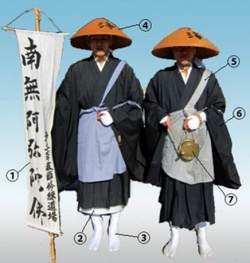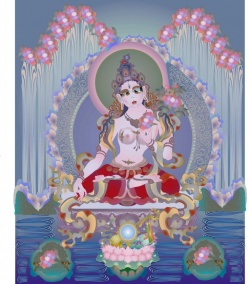Difference between revisions of "Brahma Vihara Bhavana"
(Created page with ": How To Practise The Development Of The Sublime States (Brahma-Vihara Bhavana) By Sayar U Chit Tin (IMC) : There are four sterling virtues wh...") |
|||
| (9 intermediate revisions by the same user not shown) | |||
| Line 1: | Line 1: | ||
| − | + | {{DisplayImages|3514|2211|4450|1399|3431|3420|316|1539}}<nomobile>{{DisplayImages|1828|3266|72|2284}}</nomobile> | |
| − | By | + | |
| − | Sayar U | + | |
| + | |||
| + | |||
| + | |||
| + | |||
| + | : How To Practise The [[Development]] Of The [[Sublime States]] ([[Brahma-Vihara Bhavana]]) | ||
| + | |||
| + | By [[Sayar U Chit Tin]] | ||
(IMC) | (IMC) | ||
| − | : There are four sterling [[virtues]] which are collectively termed in [[Pali]] as [[Brahma-Vihara]]: [[Sublime | + | : There are four sterling [[virtues]] which are collectively termed in [[Pali]] as [[Brahma-Vihara]]: [[Sublime States, Modes of Sublime Conduct or Divine Abodes]]. They are also called the [[four Boundless States]], Illimitable ([[Appamanna]]): |
| − | I) _[[Loving-kindness]]_: [[Metta]], the | + | I) _[[Loving-kindness]]_: [[Metta]], the [[first Sublime State]]; |
II) _[[Compassion]]_: [[Karuna]], the second [[virtue]] that is [[sublime]] for man; | II) _[[Compassion]]_: [[Karuna]], the second [[virtue]] that is [[sublime]] for man; | ||
| − | III) _Sympathetic or Appreciative [[Joy]]_: [[Mudita]], the third [[sublime]] | + | III) _Sympathetic or Appreciative [[Joy]]_: [[Mudita]], the third [[sublime]] [[virtue]]; |
| − | + | ||
| + | IV) _[[Equanimity]]_: [[Upekkha]], the fourth [[sublime]] [[virtue]], the most; difficult and the most [[essential]]. | ||
| + | |||
| + | |||
| + | |||
| + | The [[development]] of these [[Sublime States]] ([[Brahmavihara-bhavana]]) generally found in the [[Sutta]] is as follows: "There, O [[monks]], the [[monk]] with a [[mind]] full of [[Loving-kindness]] pervading first one [[direction]], then a second, then a third one, then the fourth one, just so above, below and all around; and everywhere identifying himself with all, he is pervading the whole [[world]] with [[mind]] full of [[loving-kindness]], with [[mind]] wide, developed unbounded, free from [[hate]] and illwill." Hereafter follows the same theme with [[Compassion]], [[Sympathetic Joy]], and [[Equanimity]]. | ||
| + | |||
| + | |||
| + | |||
| + | |||
| + | ===[[How To Practise Metta-Bhavana]]=== | ||
| + | |||
| − | |||
| − | |||
| − | + | : It is recommended in the [[Visuddhimagga]], the [[Path of Purification]], that one should go to some quiet place where one could sit in a comfortable position. Then one should consider the dangers in [[hate]] first and the benefits [[offered]] by [[forbearance]]. | |
| − | + | The {{Wiki|purpose}} of this [[meditation]] is to displace [[hate]] by [[forbearance]]. Then again one cannot avoid dangers one has not come to see or cultivate benefits one does not yet know. | |
| − | : | + | : There are also certain types of {{Wiki|individuals}} towards whom one should not develop [[loving-kindness]] in the first stages. To regard a disliked [[person]] as dear to one is fatiguing, to regard a dearly-loved one with [[neutrality]] is difficult, and if the slightest mischance befalls the [[friend]], one [[feels]] like weeping. |
| − | + | When an enemy is recalled [[anger]] springs up, and to put a [[neutral]] [[person]] in a respected one's or a dear one's place is fatiguing. Then if it is directed towards the opposite {{Wiki|sex}} one may arouse [[lust]]. | |
| − | : [[Cultivating]] the [[thought]]: 'May I be [[happy]]' with oneself as example, then one begins to be [[interested]] in the {{Wiki|welfare}} and [[happiness]] of others, and also to [[feel]] in some [[sense]] their [[happiness]] as if it were one's [[own]]: 'Just as I want to live happily and not [[die]], so do others.' So in this way one should first become familiar with pervading oneself with [[loving]]- [[kindness]] to serve as an example. Next, one should choose someone who is liked, admired and much respected; with the [[thought]]: 'May he be [[happy]]' and remembering his [[virtues]]. | + | Again one should not develop [[loving-kindness]] towards a [[dead person]] for one will neither reach [[absorption]] nor access, that is to say, his [[loving-kindness]] will make no headway at all. Now at the start it should be developed only towards oneself, repeatedly saying: |
| + | |||
| + | 'May I be [[happy]] and free from [[suffering]]'; 'May I keep myself free from [[enmity]], trouble and live happily.' | ||
| + | |||
| + | |||
| + | : [[Cultivating]] the [[thought]]: 'May I be [[happy]]' with oneself as example, then one begins to be [[interested]] in the {{Wiki|welfare}} and [[happiness]] of others, and also to [[feel]] in some [[sense]] their [[happiness]] as if it were one's [[own]]: | ||
| + | |||
| + | 'Just as I want to live happily and not [[die]], so do others.' So in this way one should first become familiar with pervading oneself with [[loving]]- [[kindness]] to serve as an example. Next, one should choose someone who is liked, admired and much respected; with the [[thought]]: 'May he be [[happy]]' and remembering his [[virtues]]. | ||
: When in this way one becomes familiar, one can begin to practise [[loving-kindness]] towards a dear one, then towards a [[neutral]] [[person]] as very dear, and then towards a foe as [[neutral]]. | : When in this way one becomes familiar, one can begin to practise [[loving-kindness]] towards a dear one, then towards a [[neutral]] [[person]] as very dear, and then towards a foe as [[neutral]]. | ||
: Care should be taken when dealing with an enemy for [[anger]] can arise, and all means must be tried in order to get rid of it. When this is successful, one will be able to regard a foe without [[resentment]] and with [[loving-kindness]] in the very same way as one does the admired [[person]], the dearly loved one, and the [[neutral]] [[person]]. | : Care should be taken when dealing with an enemy for [[anger]] can arise, and all means must be tried in order to get rid of it. When this is successful, one will be able to regard a foe without [[resentment]] and with [[loving-kindness]] in the very same way as one does the admired [[person]], the dearly loved one, and the [[neutral]] [[person]]. | ||
| + | |||
: [[Loving-kindness]] can now be effectively maintained in being towards all [[beings]] or to certain groups at a time, or in one [[direction]] at a time towards all [[beings]], or to certain groups in succession. | : [[Loving-kindness]] can now be effectively maintained in being towards all [[beings]] or to certain groups at a time, or in one [[direction]] at a time towards all [[beings]], or to certain groups in succession. | ||
| − | : When one can maintain this [[loving-kindness]], made much of it, use it as a [[vehicle]], use it for a foundation, be established in it, keep it consolidated and properly managed, one can expect 11 [[blessings]]: 'A man sleeps in [[peace]] and {{Wiki|comfort}}, he walks in [[peace]] and {{Wiki|comfort}}, he [[dreams]] no [[evil]] [[dreams]], he is dear to [[human beings]], he is dear to {{Wiki|non-human}} [[beings]], the [[gods]] guard him, no [[fire]] or [[poison]] or weapon harms him, his [[mind]] can be quickly [[concentrated]], the expression of his face is [[serene]], he [[dies]] without falling into [[confusion]], and even if he fails to penetrate any further he will pass on to the [[world]] of High [[Divinity]], to the [[Brahma World]].' | + | : When one can maintain this [[loving-kindness]], made much of it, use it as a [[vehicle]], use it for a foundation, be established in it, keep it consolidated and properly managed, one can expect 11 [[blessings]]: |
| + | |||
| + | 'A man sleeps in [[peace]] and {{Wiki|comfort}}, he walks in [[peace]] and {{Wiki|comfort}}, he [[dreams]] no [[evil]] [[dreams]], he is dear to [[human beings]], he is dear to {{Wiki|non-human}} [[beings]], the [[gods]] guard him, no [[fire]] or [[poison]] or weapon harms him, his [[mind]] can be quickly [[concentrated]], the expression of his face is [[serene]], he [[dies]] without falling into [[confusion]], and even if he fails to penetrate any further he will pass on to the [[world]] of High [[Divinity]], to the [[Brahma World]].' | ||
| + | |||
| + | |||
| + | This is from the [[Anguttara Nikaya]] [[Ekadassa Nipata]], [[Metta Sutta]] ([[Gradual Sayings]]). | ||
| − | |||
| − | + | ===[[Karuna Bhavana]]: [[Development of Compassion]]=== | |
| − | |||
| − | : Right at the start, the [[meditation]] of [[compassion]] should be developed on [[seeing]] a wretched [[person]], unlucky, unfortunate, in every way a fit [[object]] for [[compassion]], unsightly, reduced to utter [[misery]], [[compassion]] should be felt for this [[person]] in this way: 'This [[person]] has indeed been reduced to [[misery]]; if only he could be freed from this [[suffering]].' If one cannot encounter such a wretched [[person]], then one can arouse [[compassion]] for an [[evil]] doer: "Suppose a criminal is under orders of execution by the [[ruler]], the executors bund him and lead him off to the place of execution, flogging him a hundred times. Then the passers-by give him things to eat and he goes along eating and enjoying these things, still no one will think that he is really [[happy]]. Everyone will [[feel]] [[compassion]] for him, [[thinking]]: 'This wretched [[person]] is going to [[die]] soon; every step leads him nearer to the presence of [[death]].'" So in this way one should arouse [[compassion]] for an [[evil]] doer. | + | : For the [[development]] of [[compassion]] one should begin with the task by reviewing the [[danger]] of not having [[compassion]] and the advantage of possessing it. Like [[Metta]] ([[loving-kindness]]) [[Karuna]] ([[compassion]]) should not be directed at first towards a [[person]] who is [[neutral]], antipathetic or {{Wiki|hostile}}, towards a member of the opposite {{Wiki|sex}} or someone who is [[dead]]. |
| + | |||
| + | It is stated in the [[Vibhanga]], "How does one dwell pervading one [[direction]] with his [[heart]] endued with [[compassion]]? Just as one would [[feel]] [[compassion]] on [[seeing]] an unlucky, unfortunate [[person]], so one pervades all [[beings]] with [[compassion]]." | ||
| + | |||
| + | |||
| + | : Right at the start, the [[meditation]] of [[compassion]] should be developed on [[seeing]] a wretched [[person]], unlucky, unfortunate, in every way a fit [[object]] for [[compassion]], unsightly, reduced to utter [[misery]], [[compassion]] should be felt for this [[person]] in this way: 'This [[person]] has indeed been reduced to [[misery]]; if only he could be freed from this [[suffering]].' | ||
| + | |||
| + | If one cannot encounter such a wretched [[person]], then one can arouse [[compassion]] for an [[evil]] doer: | ||
| + | |||
| + | "Suppose a criminal is under orders of execution by the [[ruler]], the executors bund him and lead him off to the place of execution, flogging him a hundred times. | ||
| + | |||
| + | Then the passers-by give him things to eat and he goes along eating and enjoying these things, still no one will think that he is really [[happy]]. Everyone will [[feel]] [[compassion]] for him, [[thinking]]: | ||
| + | |||
| + | 'This wretched [[person]] is going to [[die]] soon; every step leads him nearer to the presence of [[death]].'" So in this way one should arouse [[compassion]] for an [[evil]] doer. | ||
| + | |||
| + | |||
| + | : After arousing [[compassion]] for an unfortunate, wretched and unlucky [[person]] in that way, one should next arouse [[compassion]] for a dear one, then a [[neutral]] [[person]] and next a {{Wiki|hostile}} [[person]], in the same way. | ||
| + | |||
| + | Care should be taken with regard to an enemy and if [[resentment]] arises one must try by all means to get rid of it in the same way used with [[loving-kindness]]. | ||
| − | |||
: At one time the [[Buddha]] set a very [[noble]] example by attending on the sick Himself and also exhorting His [[disciples]] with these words: | : At one time the [[Buddha]] set a very [[noble]] example by attending on the sick Himself and also exhorting His [[disciples]] with these words: | ||
| Line 55: | Line 99: | ||
| − | + | ===[[Mudita Bhavana]] [[Development Of Sympathetic Or Appreciative Joy]]=== | |
| + | |||
| + | |||
| + | : The [[development]] of Sympathetic or Appreciative [[Joy]] or Gladness should start with the very dear companion -- one who in the Commentaries is called a 'boon companion'; for he is always glad; he laughs first and speaks afterwards. | ||
| + | |||
| + | In the [[Vibhanga]] it is referred to in this way: 'How does a [[mediator]] dwell pervading one [[direction]] with his [[heart]] endued with sympathetic gladness? Just as one would be glad on [[seeing]] a very dear and beloved [[person]], so one pervades all [[beings]] with sypathetic gladness.' | ||
| − | : | + | : Even if someone who is dear to us is unlucky and unfortunate now Sympathetic gladness can still be aroused by remembering his [[happiness]] of the {{Wiki|past}} in this way: 'In the {{Wiki|past}} he possessed great [[wealth]] and a great following and he was always [[happy]].' Again gladness or appreciative [[joy]] can be aroused by apprehending the {{Wiki|future}} glad aspect in the dear [[person]] in this way: |
| − | + | 'In the {{Wiki|future}} this dear [[person]] will again enjoy similar [[success]] with {{Wiki|gold}} and {{Wiki|silver}} going about in {{Wiki|gold}} palanquins with great followers and so on.' | |
| + | |||
| + | : After having aroused {{Wiki|altruistic}} [[joy]] and gladness with [[respect]] to the dear one one can then direct it [[successively]] towards a [[neutral]] one and then towards a foe. But if one arouses [[resentment]] when dealing with a foe, one should make it subside in the same way as described under [[loving]]- [[kindness]]. | ||
| + | |||
| + | [[Mudita]] is not mere gladness but [[sympathetic joy]] which tends to destroy [[jealousy]], its direct enemy. It embraces all [[prosperous]] persons and is the congratulary [[attitude]] of a [[person]], and the tendency is to eliminate any dislike towards successful persons. | ||
| − | |||
===[[Upekkha]]: [[Development Of Equanimity]]=== | ===[[Upekkha]]: [[Development Of Equanimity]]=== | ||
| − | |||
| − | : Ven. [[Narada Thera]] said, "[[Equanimity]] is [[essential]], especially for [[laymen]] who have to live in an ill-balanced [[world]] amidst fluctuating circumstances. Slights and insults are the common lot of mankind. The [[world]] is so constituted that the good and the [[virtuous]] are very often [[subject]] to unjust [[criticism]] and attack. It is heroic to maintain a balanced [[mind]] in such circumstances. | + | |
| + | : The [[development]] of [[equanimity]] is the most difficult and the most [[essential]] of the [[four sublime states]]. | ||
| + | |||
| + | In the [[Buddhist]] {{Wiki|Dictionary}} [[Nyanatiloka]] says, "//[[equanimity]]//, also called [[tatra-majjhattata]], is an [[ethical]] [[quality]] belonging to the [[sankhara]] group ([[khandha]]) and should therefore not be confused with //indifferent [[feeling]]// ([[adukkhamasukha vedana]]) which is sometimes also called [[Upekkha]] ([[vedana]])." | ||
| + | |||
| + | It is one of the four [[Sublime]] [[Abodes]] and one of the [[Factors of Enlightenment]]. | ||
| + | |||
| + | It means //impartially// or //rightly//, one may discern rightly, viweing justly, or looking impartially, that is to say, without [[attachment]] or [[aversion]], and without favour or disfavour, in the [[sense]] of [[indifference]] or [[neutral]] [[feeling]]. | ||
| + | |||
| + | : Ven. [[Narada Thera]] said, "[[Equanimity]] is [[essential]], especially for [[laymen]] who have to live in an ill-balanced [[world]] amidst fluctuating circumstances. Slights and insults are the common lot of mankind. | ||
| + | |||
| + | The [[world]] is so constituted that the good and the [[virtuous]] are very often [[subject]] to unjust [[criticism]] and attack. | ||
| + | |||
| + | It is heroic to maintain a balanced [[mind]] in such circumstances. | ||
| + | |||
: Loss and gain, [[fame]] and infamy, praise and blame, [[pain]] and [[happiness]] are eight [[worldly]] [[conditions]] that affect all [[humanity]]." | : Loss and gain, [[fame]] and infamy, praise and blame, [[pain]] and [[happiness]] are eight [[worldly]] [[conditions]] that affect all [[humanity]]." | ||
| − | ; To develop [[Equanimity]] one should look on with [[equanimity]] at a [[person]] who is normally [[neutral]]. Then towards a dear one, a {{Wiki|hostile}} [[person]] and the rest. In the [[Vibhanga]] this is said: 'How does a [[meditator]] dwell pervading one [[direction]] with his [[heart]] endued with [[equanimity]]? Just as he would [[feel]] [[equanimity]] on [[seeing]] a [[person]] who was neither beloved nor unloved, so he pervades all [[beings]] with [[equanimity]].' | + | ; To develop [[Equanimity]] one should look on with [[equanimity]] at a [[person]] who is normally [[neutral]]. Then towards a dear one, a {{Wiki|hostile}} [[person]] and the rest. In the [[Vibhanga]] this is said: |
| + | |||
| + | 'How does a [[meditator]] dwell pervading one [[direction]] with his [[heart]] endued with [[equanimity]]? Just as he would [[feel]] [[equanimity]] on [[seeing]] a [[person]] who was neither beloved nor unloved, so he pervades all [[beings]] with [[equanimity]].' | ||
| + | |||
: Through the [[neutral]] [[person]] one should break down the barriers in each case between the three {{Wiki|individuals}}, namely: the dear one, the boon companion, the {{Wiki|hostile}} one, and himself. How to break down the barriers? | : Through the [[neutral]] [[person]] one should break down the barriers in each case between the three {{Wiki|individuals}}, namely: the dear one, the boon companion, the {{Wiki|hostile}} one, and himself. How to break down the barriers? | ||
: Suppose a man is staying together in an abode with a dear, a [[neutral]], and a {{Wiki|hostile}} [[person]]; and {{Wiki|robbers}} come to him and ask for a [[person]] because they wish to cut his {{Wiki|throat}} and use the {{Wiki|blood}} as an [[offering]]. If he points to one of the three, he has not broken down the barriers. Or if he offers himself too he has not broken down the barriers either. Why? | : Suppose a man is staying together in an abode with a dear, a [[neutral]], and a {{Wiki|hostile}} [[person]]; and {{Wiki|robbers}} come to him and ask for a [[person]] because they wish to cut his {{Wiki|throat}} and use the {{Wiki|blood}} as an [[offering]]. If he points to one of the three, he has not broken down the barriers. Or if he offers himself too he has not broken down the barriers either. Why? | ||
| + | |||
: Because he seeks the harm of himself and seeks the {{Wiki|welfare}} of others. Only when he does not see a single [[person]] among them to be given and he directs his [[mind]] impartially towards himself and towards others has he broken down the barriers. | : Because he seeks the harm of himself and seeks the {{Wiki|welfare}} of others. Only when he does not see a single [[person]] among them to be given and he directs his [[mind]] impartially towards himself and towards others has he broken down the barriers. | ||
| − | : In the [[development]] of the four [[Sublime]] States, [[Brahma-vihara | + | : In the [[development]] of the four [[Sublime]] States, [[Brahma-vihara Bhavana]], one should practise each of these [[virtues]] over and over again so that one accomplishes [[mental]] impartiality towards the four persons, namely, oneself, the dear [[person]], the [[neutral]] one and the {{Wiki|hostile}} [[person]]. |
: The [[Visuddhimagga]] says, 'Thus the sign and access are obtained by this [[person]] simultaneously with the breaking down of the barriers. But when breaking down of the barriers has been effected, he reaches [[absorption]]...' | : The [[Visuddhimagga]] says, 'Thus the sign and access are obtained by this [[person]] simultaneously with the breaking down of the barriers. But when breaking down of the barriers has been effected, he reaches [[absorption]]...' | ||
| + | |||
: [[Metta]] ([[Loving-kindness]]) embraces all [[sentient beings]], [[Karuna]] ([[Compassion]]) embraces unfortunate [[beings]], [[Mudita]] (Gladness) embraces the [[happy]] and [[prosperous]], and [[Upekkha]] ([[Equanimity]]) embraces the good and the bad, the loved and the unloved, the [[pleasant]] and the [[unpleasant]]. | : [[Metta]] ([[Loving-kindness]]) embraces all [[sentient beings]], [[Karuna]] ([[Compassion]]) embraces unfortunate [[beings]], [[Mudita]] (Gladness) embraces the [[happy]] and [[prosperous]], and [[Upekkha]] ([[Equanimity]]) embraces the good and the bad, the loved and the unloved, the [[pleasant]] and the [[unpleasant]]. | ||
: May all [[beings]] be [[happy]] and {{Wiki|liberated}}! | : May all [[beings]] be [[happy]] and {{Wiki|liberated}}! | ||
| + | {{R}} | ||
| + | [http://www.vimuttisukha.com/2009/02/brahma-vihara-bhavana.html?m=1 www.vimuttisukha.com] | ||
| + | [[Category:Brahmavihara]] | ||
| + | {{SanskritTerminology}} | ||
Latest revision as of 09:42, 20 January 2016
- How To Practise The Development Of The Sublime States (Brahma-Vihara Bhavana)
By Sayar U Chit Tin (IMC)
- There are four sterling virtues which are collectively termed in Pali as Brahma-Vihara: Sublime States, Modes of Sublime Conduct or Divine Abodes. They are also called the four Boundless States, Illimitable (Appamanna):
I) _Loving-kindness_: Metta, the first Sublime State;
II) _Compassion_: Karuna, the second virtue that is sublime for man;
III) _Sympathetic or Appreciative Joy_: Mudita, the third sublime virtue;
IV) _Equanimity_: Upekkha, the fourth sublime virtue, the most; difficult and the most essential.
The development of these Sublime States (Brahmavihara-bhavana) generally found in the Sutta is as follows: "There, O monks, the monk with a mind full of Loving-kindness pervading first one direction, then a second, then a third one, then the fourth one, just so above, below and all around; and everywhere identifying himself with all, he is pervading the whole world with mind full of loving-kindness, with mind wide, developed unbounded, free from hate and illwill." Hereafter follows the same theme with Compassion, Sympathetic Joy, and Equanimity.
How To Practise Metta-Bhavana
- It is recommended in the Visuddhimagga, the Path of Purification, that one should go to some quiet place where one could sit in a comfortable position. Then one should consider the dangers in hate first and the benefits offered by forbearance.
The purpose of this meditation is to displace hate by forbearance. Then again one cannot avoid dangers one has not come to see or cultivate benefits one does not yet know.
- There are also certain types of individuals towards whom one should not develop loving-kindness in the first stages. To regard a disliked person as dear to one is fatiguing, to regard a dearly-loved one with neutrality is difficult, and if the slightest mischance befalls the friend, one feels like weeping.
When an enemy is recalled anger springs up, and to put a neutral person in a respected one's or a dear one's place is fatiguing. Then if it is directed towards the opposite sex one may arouse lust.
Again one should not develop loving-kindness towards a dead person for one will neither reach absorption nor access, that is to say, his loving-kindness will make no headway at all. Now at the start it should be developed only towards oneself, repeatedly saying:
'May I be happy and free from suffering'; 'May I keep myself free from enmity, trouble and live happily.'
- Cultivating the thought: 'May I be happy' with oneself as example, then one begins to be interested in the welfare and happiness of others, and also to feel in some sense their happiness as if it were one's own:
'Just as I want to live happily and not die, so do others.' So in this way one should first become familiar with pervading oneself with loving- kindness to serve as an example. Next, one should choose someone who is liked, admired and much respected; with the thought: 'May he be happy' and remembering his virtues.
- When in this way one becomes familiar, one can begin to practise loving-kindness towards a dear one, then towards a neutral person as very dear, and then towards a foe as neutral.
- Care should be taken when dealing with an enemy for anger can arise, and all means must be tried in order to get rid of it. When this is successful, one will be able to regard a foe without resentment and with loving-kindness in the very same way as one does the admired person, the dearly loved one, and the neutral person.
- Loving-kindness can now be effectively maintained in being towards all beings or to certain groups at a time, or in one direction at a time towards all beings, or to certain groups in succession.
- When one can maintain this loving-kindness, made much of it, use it as a vehicle, use it for a foundation, be established in it, keep it consolidated and properly managed, one can expect 11 blessings:
'A man sleeps in peace and comfort, he walks in peace and comfort, he dreams no evil dreams, he is dear to human beings, he is dear to non-human beings, the gods guard him, no fire or poison or weapon harms him, his mind can be quickly concentrated, the expression of his face is serene, he dies without falling into confusion, and even if he fails to penetrate any further he will pass on to the world of High Divinity, to the Brahma World.'
This is from the Anguttara Nikaya Ekadassa Nipata, Metta Sutta (Gradual Sayings).
Karuna Bhavana: Development of Compassion
- For the development of compassion one should begin with the task by reviewing the danger of not having compassion and the advantage of possessing it. Like Metta (loving-kindness) Karuna (compassion) should not be directed at first towards a person who is neutral, antipathetic or hostile, towards a member of the opposite sex or someone who is dead.
It is stated in the Vibhanga, "How does one dwell pervading one direction with his heart endued with compassion? Just as one would feel compassion on seeing an unlucky, unfortunate person, so one pervades all beings with compassion."
- Right at the start, the meditation of compassion should be developed on seeing a wretched person, unlucky, unfortunate, in every way a fit object for compassion, unsightly, reduced to utter misery, compassion should be felt for this person in this way: 'This person has indeed been reduced to misery; if only he could be freed from this suffering.'
If one cannot encounter such a wretched person, then one can arouse compassion for an evil doer:
"Suppose a criminal is under orders of execution by the ruler, the executors bund him and lead him off to the place of execution, flogging him a hundred times.
Then the passers-by give him things to eat and he goes along eating and enjoying these things, still no one will think that he is really happy. Everyone will feel compassion for him, thinking:
'This wretched person is going to die soon; every step leads him nearer to the presence of death.'" So in this way one should arouse compassion for an evil doer.
- After arousing compassion for an unfortunate, wretched and unlucky person in that way, one should next arouse compassion for a dear one, then a neutral person and next a hostile person, in the same way.
Care should be taken with regard to an enemy and if resentment arises one must try by all means to get rid of it in the same way used with loving-kindness.
- At one time the Buddha set a very noble example by attending on the sick Himself and also exhorting His disciples with these words:
- "He who ministers unto the sick ministers unto me."
- The Buddha showed great compassion towards the courtesan Ambapali, and also towards Angulimala, the murderer, both were converted and underwent a complete reformation in character.
Mudita Bhavana Development Of Sympathetic Or Appreciative Joy
- The development of Sympathetic or Appreciative Joy or Gladness should start with the very dear companion -- one who in the Commentaries is called a 'boon companion'; for he is always glad; he laughs first and speaks afterwards.
In the Vibhanga it is referred to in this way: 'How does a mediator dwell pervading one direction with his heart endued with sympathetic gladness? Just as one would be glad on seeing a very dear and beloved person, so one pervades all beings with sypathetic gladness.'
- Even if someone who is dear to us is unlucky and unfortunate now Sympathetic gladness can still be aroused by remembering his happiness of the past in this way: 'In the past he possessed great wealth and a great following and he was always happy.' Again gladness or appreciative joy can be aroused by apprehending the future glad aspect in the dear person in this way:
'In the future this dear person will again enjoy similar success with gold and silver going about in gold palanquins with great followers and so on.'
- After having aroused altruistic joy and gladness with respect to the dear one one can then direct it successively towards a neutral one and then towards a foe. But if one arouses resentment when dealing with a foe, one should make it subside in the same way as described under loving- kindness.
Mudita is not mere gladness but sympathetic joy which tends to destroy jealousy, its direct enemy. It embraces all prosperous persons and is the congratulary attitude of a person, and the tendency is to eliminate any dislike towards successful persons.
Upekkha: Development Of Equanimity
- The development of equanimity is the most difficult and the most essential of the four sublime states.
In the Buddhist Dictionary Nyanatiloka says, "//equanimity//, also called tatra-majjhattata, is an ethical quality belonging to the sankhara group (khandha) and should therefore not be confused with //indifferent feeling// (adukkhamasukha vedana) which is sometimes also called Upekkha (vedana)."
It is one of the four Sublime Abodes and one of the Factors of Enlightenment.
It means //impartially// or //rightly//, one may discern rightly, viweing justly, or looking impartially, that is to say, without attachment or aversion, and without favour or disfavour, in the sense of indifference or neutral feeling.
- Ven. Narada Thera said, "Equanimity is essential, especially for laymen who have to live in an ill-balanced world amidst fluctuating circumstances. Slights and insults are the common lot of mankind.
The world is so constituted that the good and the virtuous are very often subject to unjust criticism and attack.
It is heroic to maintain a balanced mind in such circumstances.
- Loss and gain, fame and infamy, praise and blame, pain and happiness are eight worldly conditions that affect all humanity."
- To develop Equanimity one should look on with equanimity at a person who is normally neutral. Then towards a dear one, a hostile person and the rest. In the Vibhanga this is said
'How does a meditator dwell pervading one direction with his heart endued with equanimity? Just as he would feel equanimity on seeing a person who was neither beloved nor unloved, so he pervades all beings with equanimity.'
- Through the neutral person one should break down the barriers in each case between the three individuals, namely: the dear one, the boon companion, the hostile one, and himself. How to break down the barriers?
- Suppose a man is staying together in an abode with a dear, a neutral, and a hostile person; and robbers come to him and ask for a person because they wish to cut his throat and use the blood as an offering. If he points to one of the three, he has not broken down the barriers. Or if he offers himself too he has not broken down the barriers either. Why?
- Because he seeks the harm of himself and seeks the welfare of others. Only when he does not see a single person among them to be given and he directs his mind impartially towards himself and towards others has he broken down the barriers.
- In the development of the four Sublime States, Brahma-vihara Bhavana, one should practise each of these virtues over and over again so that one accomplishes mental impartiality towards the four persons, namely, oneself, the dear person, the neutral one and the hostile person.
- The Visuddhimagga says, 'Thus the sign and access are obtained by this person simultaneously with the breaking down of the barriers. But when breaking down of the barriers has been effected, he reaches absorption...'
- Metta (Loving-kindness) embraces all sentient beings, Karuna (Compassion) embraces unfortunate beings, Mudita (Gladness) embraces the happy and prosperous, and Upekkha (Equanimity) embraces the good and the bad, the loved and the unloved, the pleasant and the unpleasant.











